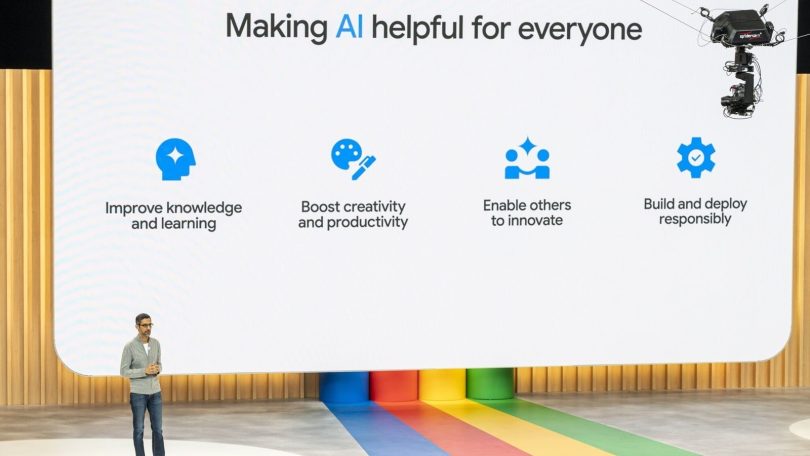[ad_1]
Artificial intelligence has become the latest buzzword in the tech world, with companies like OpenAI, Microsoft, Meta, and Google racing to develop their own AI systems. At the recent Google I/O 2023 Keynote, Google unveiled a range of hardware and software products, showcasing its commitment to AI integration in various aspects of our lives.

Google’s CEO, Sundar Pichai, has been an advocate for the potential of artificial intelligence and its impact on the future of work. In an interview with The Verge’s Nilay Patel, Pichai expressed his belief that AI would revolutionize every aspect of our lives, including the labor market. He acknowledged that major disruptions would occur but also pointed out that AI could enhance certain jobs if implemented correctly.
Pichai used the legal sector as an example, stating that AI advancements could bring about significant changes in the field. However, he emphasized that AI would not completely eliminate the need for certain skills and services. “So artificial intelligence will improve the profession in certain aspects, it may have some unintended consequences, but I’m willing to almost bet that 10 years from now maybe there will be more lawyers,” he stated confidently.
The Google CEO also drew parallels between the current concerns surrounding AI and previous technological advancements such as personal computers, the internet, and cell phones. Pichai mentioned that predictions made two decades ago about entire job categories disappearing did not fully come to pass. He suggested that a “platform shift” was occurring with AI, just as it did with previous technologies, and that new opportunities would arise for human workers.
While Pichai’s statements paint a positive picture of AI’s impact on the labor market, reactions from the public have been mixed. Some agree with his viewpoint, acknowledging that AI has historically enabled human productivity and expanded our capabilities. They argue that AI’s role will be to support humans rather than replace them entirely. For example, in the medical field, AI could assist doctors in their duties, leading to a better work-life balance.
However, there are also skeptics who express concerns about the potential dangers of AI and its impact on employment. They caution that as AI technologies advance, there is a real possibility of human-like interactions with AI systems. This could lead to job displacement in various sectors and raise ethical dilemmas surrounding the use of AI.
It is evident that the future impact of AI on jobs is a complex and multifaceted topic, requiring further discussion and exploration. While Pichai’s optimism is encouraging, it is crucial for society to engage in thoughtful conversations about the potential benefits, challenges, and ethical implications associated with the widespread adoption of AI. Only through careful consideration and proactive planning can we navigate this new technological frontier while ensuring a positive future for humanity.
[ad_2]
Source link








